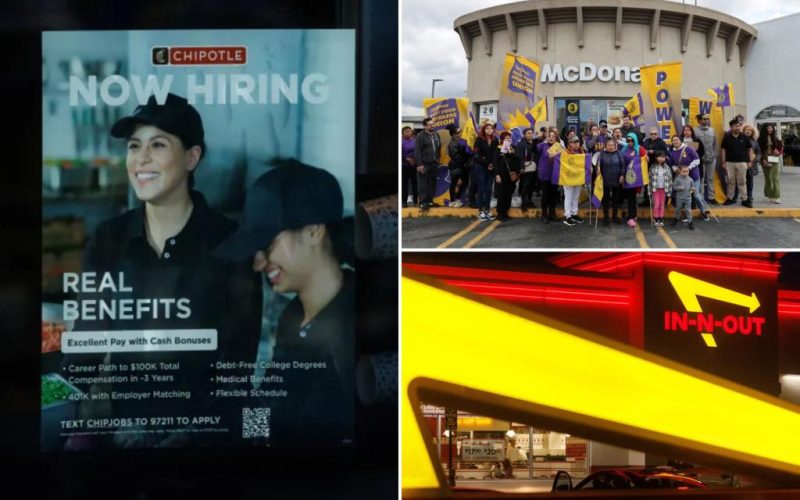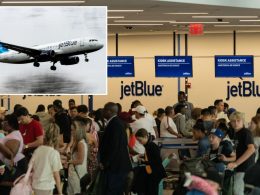Hundreds of California fast food restaurant owners warned the state against a proposal to hike the minimum wage above the $20 an hour that was passed last year — saying it would “cripple” small businesses struggling to survive.
The union representing fast food workers has urged the state’s Democrat-led Fast Food Council to hike the minimum wage to $20.70 an hour — a 3.5% increase.
“An additional wage increase would unfairly single out our livelihoods once again and cripple thousands of small business owners like us who are already struggling to survive the $20/hour minimum wage, our customers, and our employees,” the owners of 625 fast food restaurants wrote in a Dec. 23 letter to the Fast Food Council.
Last April’s 25% increase, from $16 an hour to a $20 hourly rate, led several major fast food chains to hike menu prices — with some shuttering locations because of increased labor costs.
The franchise owners said they are still trying to recover from the effects of the initial hike signed into law by Democratic Gov. Gavin Newsom.
“This increase dealt a devastating blow to our local restaurants and local jobs, resulting in higher food prices for families already struggling with the high cost of living,” the restaurant owners wrote in their letter, which was first reported by National Review.
“It unfair to single out local restaurant owners — yet again — for higher wages that no other industry is forced to pay.”
They pointed to a survey taken last July that found that 98% had to raise food prices, while 89% cut employee hours.
Nearly three in four — 74% — reported an increased likelihood of shutting down their restaurants, while 73% said that they had to limit employee shift pick-up or overtime opportunities.
Seven out of 10 restaurant owners reported that they either reduced staff or consolidated positions as a result of the $20 an hour law.
“The impacts of the $20/hour minimum wage are well-chronicled – with thousands of fast food employee layoffs, hundreds of restaurants shut down, and food prices at local restaurants up by 13% overall,” the letter stated.
Fast food chains that raised prices included In-N-Out, which increased its burger prices by 25 cents, while Chipotle hiked the price of its Chicken Burrito by 8.3%.
Rubio’s California Grill, known for its fish tacos, closed 48 of its nearly 134 locations at the end of May – before filing for bankruptcy in June.
The Post has sought comment from the Fast Food Council.
A spokesperson for Newsom disputed the negative impact of the higher minimum wage, pointing to a Harvard study which found “no evidence that wage increases were accompanied by a reduction in fringe benefits” and “no evidence that wage increases had unintended consequences on staffing, scheduling or wage theft.”
Newsom’s office also cited a study by UC Berkeley’s Institute for Research and Labor Employment which found that the minimum wage increase yielded “significant benefits for workers, without the devastating consequences that critics predicted.”
The governor’s aides say that since the new law went into effect, the fast food sector in the state has added jobs. As of July, there were 750,500 fast food jobs in California — the highest in state history and 11,000 more compared to when the law took effect, according to Newsom’s office.
Stanford’s Hoover Institution recently retracted an article which cited data that pointed to a loss of nearly 10,000 fast food jobs after the $20 an hour minimum wage bill was signed into law in 2023.
The California Fast Food Council is the regulatory state agency that was created under the Fast Food Accountability and Standards Recovery Act (FAST Act), which was signed into law by Newsom, a Democrat, in September 2022.
The council, which consists of 10 members appointed by the governor, is empowered to raise the minimum wage by up to 3.5% — or the annual rate of inflation each year — beginning Jan. 1 of this year.
The union representing fast food workers has accused restaurant owners of cutting employee hours in response to the wage increase — all but offsetting the hike in wages.








